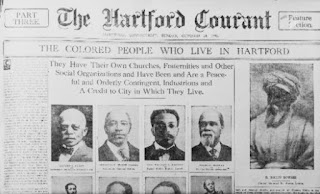 To keep up with the changing media, I decided to find an article to write about that is relevant to the struggling newspaper industry. I immediately came across an article about the Hartford Courant. I had just saw a TV commercial from the Hartford Courant that was showing their "newly added sections" into the paper, so I assumed that they were trying to get more readers interested to keep the paper alive. When I clicked on the article, I could not believe what it was saying. The headline was "Hartford Courant sued by another paper for Plagiarism." This didn't make sense to me! I had just saw a commercial for the newspaper and thought they were making an effort to get their paper back on track.
To keep up with the changing media, I decided to find an article to write about that is relevant to the struggling newspaper industry. I immediately came across an article about the Hartford Courant. I had just saw a TV commercial from the Hartford Courant that was showing their "newly added sections" into the paper, so I assumed that they were trying to get more readers interested to keep the paper alive. When I clicked on the article, I could not believe what it was saying. The headline was "Hartford Courant sued by another paper for Plagiarism." This didn't make sense to me! I had just saw a commercial for the newspaper and thought they were making an effort to get their paper back on track.My first instinct was "Wow, now that is embarrassing." I thought this because the Hartford Courant is the oldest newspaper in America. They've always been looked up to for basically starting print journalism. The Hartford Courant brought the news to where it is today. You'd think that such a prestigious paper would write their own articles and not rely on another newspaper's articles.
This whole issue began over the summer when locals were noticing similar articles in the Courant and in the Journal Inquirer. The Journal Inquirer is "Northern Connecticut's Hometown Paper" that competes with the Courant. The Courant also used articles from the Bristol Press, The New Britain Herald, Torrington Register-Citizen, and Waterbury Republican-American. The Journal Inquirer has posted on their website that they will be seeking damages, attorney's fees, and punitive damages.
I noticed a comment on that article from a guy named Lou. What he said made total sense to me and I would agree with it.
Lou wrote on Nov 19, 2009 11:55 AM:
"While I do like the Courant, they seem to be spiraling downward...between their dispute with Mr. Gombossy and this issue, the COurant is becoming almost Titanic like.
"While I do like the Courant, they seem to be spiraling downward...between their dispute with Mr. Gombossy and this issue, the COurant is becoming almost Titanic like.
The newspaper plagiarizing other articles makes me not want to read their paper. They should write their own articles like other newspapers do. This is not the way you try to save your paper. Plagiarizing?! That's just dumb, it gives your paper a bad name. Whether they really plagiarized or not, it still makes me look down on them.

